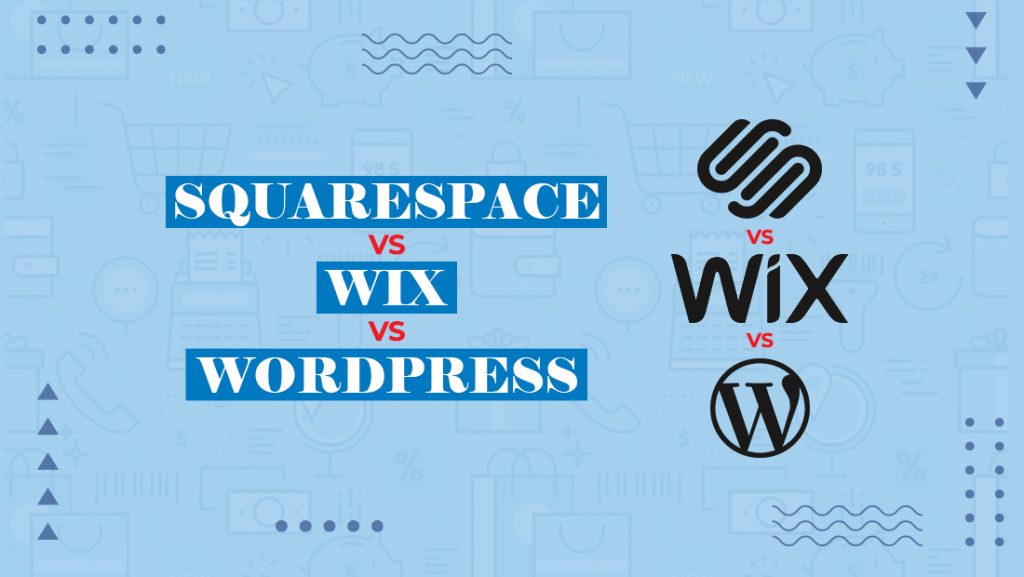Table of Contents:
-
Introduction
- Brief overview of website builders
- Importance of choosing the right platform
-
Squarespace: A Comprehensive Review
- Features and capabilities
- Ease of use
- Templates and design options
- Pricing and plans
- Pros and cons
-
Wix: Exploring the Platform
- Features and functionality
- User-friendliness
- Design templates and customization
- Pricing tiers and options
- Advantages and disadvantages
-
WordPress: The Power of Open Source
- Overview of WordPress
- Self-hosted vs. WordPress.com
- Customization and flexibility
- Plugins and themes
- Costs and considerations
-
Comparing Squarespace, Wix, and WordPress
- Ease of use and learning curve
- Design and customization
- Content management and blogging
- E-commerce capabilities
- SEO and marketing tools
- Pricing and value for money
-
Which Platform Is Right for You?
- Identifying your specific needs
- Making an informed decision
- Factors to consider
- Case scenarios for choosing each platform
-
Conclusion
- Recap of key points
- Making the right choice for your website
Introduction
Squarespace vs Wix vs WordPress .Do you want to know a comparison about these three? WordPress is a content management system that helps the users to create websites by drag and drop. Then you are at the right place.Wix is some sort of alternative to the WordPress. IN today’s digital age, establishing an online presence is essential for individuals, businesses, and organizations alike. Whether you’re a budding entrepreneur, an established company, or a creative looking to showcase your work, a website is your digital storefront. However, creating a website can be a daunting task, especially if you’re not well-versed in web development. That’s where website builders come to the rescue.
Brief Overview of Website Builders
Website builders are online platforms that allow you to create and customize websites without the need for extensive coding or technical expertise. They offer a range of templates, design tools, and features that empower individuals and businesses to bring their online visions to life. These platforms have revolutionized the way websites are built, making it accessible to everyone, regardless of their technical background.
Importance of Choosing the Right Platform
Selecting the right website builder is a decision of paramount significance. Your choice will impact your website’s functionality, design, scalability, and overall success. It’s not just about creating a website; it’s about creating the right website—one that aligns with your goals, content, and target audience.
Squarespace: A Comprehensive Review
Squarespace is a popular website builder known for its stunning design templates and user-friendly interface. In this section, we’ll explore its features and capabilities, ease of use, design options, pricing, and the pros and cons.
-
Features and Capabilities:
Squarespace offers a robust set of features designed to create visually appealing and functional websites. Some of its key features include:-
Templates:
Squarespace provides a wide range of professionally designed templates suitable for various purposes, from personal blogs to e-commerce stores. -
Drag-and-Drop Builder:
The platform offers an intuitive drag-and-drop interface that simplifies the process of customizing your site’s layout and design. -
E-commerce Tools:
Squarespace excels in e-commerce, offering features like product listings, inventory management, and secure payment processing. -
Blogging:
It includes built-in blogging tools, making it easy to create and manage a blog with features like categories, tags, and scheduling. -
SEO Tools:
Squarespace provides tools to optimize your site for search engines, including customizable meta tags and clean, SEO-friendly code. -
Analytics:
You can track website traffic and user behavior through integrated analytics, giving you insights to improve your site’s performance.
-
-
Ease of Use:
Squarespace is known for its user-friendly interface. It’s an excellent choice for those who may not have technical skills. The drag-and-drop builder, pre-designed templates, and straightforward settings make it easy to get started. While there might be a slight learning curve for some, Squarespace’s user support and extensive documentation help users navigate the platform. -
Templates and Design Options:
Squarespace’s standout feature is its stunning templates. These templates are designed by professionals and cover a wide range of industries and styles. You can easily switch between templates without losing your content. The platform also allows deep customization, making it possible to create a unique website with just a little effort. -
Pricing and Plans:
Squarespace offers several pricing plans, including personal, business, and e-commerce options. The pricing is competitive, considering the features and design quality it provides. However, it’s essential to evaluate your specific needs to choose the plan that best suits you.-
Personal Plan:
Ideal for individuals and bloggers, offering essential features. -
Business Plan:
Suitable for small businesses with added marketing and e-commerce features. -
Basic Commerce:
Designed for starting an online store with key e-commerce features. -
Advanced Commerce:
Offers advanced e-commerce features and customer accounts.
-
-
Pros and Cons:
-
Pros:
- Beautiful, professionally designed templates.
- User-friendly and intuitive interface.
- Strong e-commerce capabilities.
- Built-in blogging features.
- Solid SEO tools.
- Reliable customer support.
-
Cons:
- Limited third-party integrations compared to WordPress.
- Some may find the pricing relatively higher for advanced features.
-
Wix: Exploring the Platform
Wix is a widely used website builder known for its user-friendly interface and a range of features that cater to various website needs. In this section, we’ll explore its features and functionality, user-friendliness, design templates, pricing tiers, and the advantages and disadvantages.
-
Features and Functionality:
Wix offers a comprehensive set of features that can accommodate a wide range of website types. Some of its key features include:-
Drag-and-Drop Builder:
Wix’s most prominent feature is its drag-and-drop website builder. Users can easily create and customize their websites by dragging and dropping elements onto the page. -
Templates and Design Tools:
Wix boasts a vast library of templates, catering to different industries and styles. The platform also allows advanced design customization, giving users creative control over their site’s appearance. -
App Market:
Wix offers an App Market where you can integrate various third-party apps and features into your website, enhancing its functionality. -
Blogging and E-commerce:
Wix provides built-in blogging and e-commerce capabilities, making it suitable for bloggers and online store owners. -
SEO Tools:
Users can optimize their websites for search engines with Wix’s SEO tools, including meta tags, alt text, and clean code.
-
-
User-Friendliness:
Wix is renowned for its user-friendliness. The intuitive drag-and-drop builder, along with the user-friendly interface, makes it an excellent choice for beginners. Users can create a website without any coding or design expertise. Extensive guides and support are available to assist users in navigating the platform. -
Design Templates and Customization:
Wix stands out for its rich selection of templates. These templates are professionally designed, and users can customize them to their liking. However, once you choose a template, you’re locked into it, and changing templates can result in content loss. The design customization options are vast, offering creative freedom. -
Pricing Tiers and Options:
Wix offers several pricing plans, including free and premium options. The pricing structure is relatively flexible, allowing users to choose a plan that aligns with their needs.-
Free Plan:
Ideal for personal projects or testing the platform’s features with Wix-branded domain names. -
Combo Plan:
Suited for personal use, offering additional storage and bandwidth. -
Unlimited Plan:
Great for entrepreneurs and freelancers with increased resources. -
Business and E-commerce Plans:
Designed for small businesses, online stores, and professional use with advanced features.
-
-
Advantages and Disadvantages:
-
Advantages:
- User-friendly, especially for beginners.
- Abundance of professionally designed templates.
- Extensive design customization options.
- The App Market adds functionality.
- Suitable for bloggers and small businesses.
- Competitive pricing, including a free plan.
-
Disadvantages:
- Template switch can result in content loss.
- Advanced users might find design limitations.
- Limited control over SEO compared to self-hosted platforms like WordPress.
-
WordPress: The Power of Open Source
WordPress is one of the most popular content management systems (CMS) globally, known for its open-source nature and versatility. In this section, we’ll provide an overview of WordPress, discuss the difference between self-hosted and WordPress.com, explore customization and flexibility, delve into plugins and themes, and consider the costs and other essential factors.
-
Overview of WordPress:
WordPress is a free, open-source CMS that allows you to create and manage websites and blogs. It was initially developed as a blogging platform but has evolved into a powerful and flexible CMS used for various purposes. WordPress is renowned for its user-friendliness, a vast and active community, and the ability to extend its functionality through plugins and themes. -
Self-hosted vs. WordPress.com:
One of the first decisions when using WordPress is whether to go with a self-hosted solution or use WordPress.com.-
Self-Hosted:
With a self-hosted WordPress, you have complete control over your website. You’ll need to choose a hosting provider, install WordPress, and manage all aspects of your site, including maintenance, security, and backups. -
WordPress.com:
WordPress.com is a hosted service where WordPress takes care of hosting for you. It’s user-friendly and suitable for beginners, but it comes with limitations on customization and monetization.
-
-
Customization and Flexibility:
WordPress is celebrated for its high level of customization and flexibility. Users can tailor their websites to their exact needs and preferences. This includes the ability to:- Choose from thousands of themes to give your site a unique look.
- Install and configure plugins to add features and functionality.
- Customize the site’s layout, design, and functionality through themes and code if you have coding skills.
-
Plugins and Themes:
-
Plugins:
WordPress has a vast library of plugins that enhance your website’s capabilities. Whether you need SEO tools, e-commerce functionality, social media integration, or security enhancements, there’s likely a plugin for it. Popular plugins like Yoast SEO, WooCommerce, and Jetpack offer diverse functionalities. -
Themes:
WordPress offers a wide range of themes that serve as the design foundation for your site. These themes can be free or premium, and they cover various styles and industries. Customization options within themes can range from basic to extensive, depending on the theme’s design.
-
-
Costs and Considerations:
-
Costs:
WordPress as a CMS is free. However, there are associated costs, particularly if you choose a self-hosted solution. These costs include domain registration, hosting fees, and potentially premium themes and plugins. WordPress.com offers various pricing plans, including a free plan with limited features. -
Considerations:
Consider factors like website hosting, maintenance, and security. Self-hosted sites require more technical expertise, while WordPress.com simplifies the process but comes with some limitations.
-
Comparing Squarespace, Wix, and WordPress
When choosing a platform for your website, considering factors like ease of use, design, content management, e-commerce, SEO, pricing, and value for money is crucial. Let’s dive into how Squarespace, Wix, and WordPress stack up against each of these aspects.
-
Ease of Use and Learning Curve:
-
Squarespace:
Squarespace is known for its user-friendly interface. It offers a straightforward drag-and-drop builder with pre-built elements, making it easy for beginners to create a website quickly. The learning curve is gentle, and no coding knowledge is required. -
Wix:
Wix is also beginner-friendly, with a highly intuitive drag-and-drop editor. Users can customize templates and add features effortlessly. The platform provides step-by-step guidance, making it suitable for those with no web design experience. -
WordPress:
WordPress has a steeper learning curve, particularly for beginners. While it offers a user-friendly block editor (Gutenberg), users might need some time to grasp its full potential. Customization and functionality can be complex, but there’s a wealth of online resources and a supportive community.
-
-
Design and Customization:
-
Squarespace:
Squarespace is praised for its stunning and modern design templates. It offers limited customization compared to WordPress but more than Wix. Users can tweak templates and style elements within them. -
Wix:
Wix provides an extensive library of templates across different categories. It’s highly customizable, allowing users to change nearly any aspect of their site’s design. It’s a middle ground between Squarespace and WordPress in terms of design flexibility. -
WordPress:
WordPress is the most flexible when it comes to design customization. It offers thousands of themes, both free and premium. Users can modify themes extensively and even create entirely custom designs if they have coding skills.
-
-
Content Management and Blogging:
-
Squarespace:
Squarespace excels at content management and blogging. It offers a clean and intuitive interface for creating and organizing content. It’s a top choice for bloggers, creatives, and content-driven websites. -
Wix:
Wix has improved its blogging capabilities over the years. It provides essential blogging tools, but it might not be as robust as Squarespace or WordPress for content-heavy websites. - WordPress: WordPress is renowned for its blogging capabilities. It’s the go-to choice for bloggers, news sites, and content publishers. The block editor makes content creation efficient and flexible.
-
-
E-commerce Capabilities:
-
Squarespace:
Squarespace offers a range of e-commerce features, making it suitable for small to medium-sized online stores. It includes inventory management, secure payments, and product display. - Wix: Wix has a robust e-commerce platform that’s suitable for various online stores. It provides tools for product listings, payments, and shipping, along with a customizable shopping cart.
- WordPress: WordPress, particularly with the WooCommerce plugin, is a powerhouse for e-commerce. It’s highly scalable, allowing businesses of all sizes to create and manage online stores. WooCommerce offers extensive features and customization options.
-
- SEO and Marketing Tools:
- Squarespace: Squarespace offers basic SEO tools, such as customizable meta tags and clean HTML coding. It’s suitable for small businesses and bloggers. It provides built-in marketing features like email campaigns.
- Wix: Wix provides SEO features like meta tags, alt text, and a mobile-responsive design. It also offers basic marketing tools and integrations with email marketing services.
- WordPress: WordPress is a leader in SEO capabilities. With the right plugins (e.g., Yoast SEO), users can optimize their sites extensively. It also offers numerous marketing and analytics plugins.
- Pricing and Value for Money:
- Squarespace: Squarespace offers competitive pricing with plans ranging from personal websites to advanced e-commerce. It’s an excellent value for users who appreciate its design and features.
- Wix: Wix provides affordable plans for personal websites and small businesses. The higher-tier plans offer more advanced features, and it’s generally considered a good value for money.
- WordPress: WordPress itself is free, but costs can accumulate with hosting, domain registration, themes, and plugins. While it can be cost-effective, users need to manage expenses and value based on their specific needs.
Which Platform Is Right for You?
Choosing the right website-building platform is a crucial decision. To make an informed choice, you need to identify your specific needs and consider various factors. Let’s delve into the details:
- Identifying Your Specific Needs:
- Website Purpose: Consider the primary purpose of your website. Are you creating a personal blog, an online store, a portfolio, or a business website? Understanding your website’s core function is the first step in determining your needs.
-
Design Preferences:
Assess your design preferences. Do you prefer a highly customizable design or a more straightforward, template-driven approach? Your design choices should align with your brand or personal style. -
Technical Proficiency:
Evaluate your technical skills. Are you comfortable with coding and advanced web development, or do you need a platform that doesn’t require coding expertise? -
Content Volume:
Think about the volume and type of content you’ll be publishing. Will you regularly update a blog, feature multimedia content, or run an e-commerce store with a large product catalog? -
Budget:
Determine your budget for website creation and maintenance. Consider not only initial costs but also ongoing expenses like hosting, domain registration, and potential premium plugins or themes.
-
Making an Informed Decision:
Once you’ve identified your needs, you can make an informed decision:- If you value ease of use, stunning design templates, and don’t require extensive customizability, Squarespace might be the right choice. It’s perfect for bloggers, creatives, and those who want an aesthetically pleasing website without much technical hassle.
- If you seek a balance between user-friendliness and design flexibility, Wix is a strong contender. It’s suitable for personal websites, small businesses, and those who appreciate a variety of templates and customization options.
- If you prioritize complete control, unlimited customization, and scalability, WordPress is your platform. It’s ideal for bloggers, e-commerce entrepreneurs, large organizations, and anyone with coding skills or a willingness to learn.
-
Factors to Consider:
Several factors should influence your decision:-
Scalability:
Think about the future. If you plan to expand your website or business, choose a platform that can grow with you. WordPress offers the most scalability in this regard. -
SEO:
If search engine visibility is crucial, consider the SEO capabilities of each platform. WordPress is the strongest here, but Squarespace and Wix offer adequate SEO tools. -
E-commerce:
For an online store, carefully assess e-commerce features and scalability. While Squarespace and Wix are suitable for small to medium-sized stores, WordPress with WooCommerce is the most powerful option for larger e-commerce ventures. -
Community and Support:
Investigate the availability of community support, forums, and customer service. WordPress has an extensive community, while Squarespace and Wix offer direct customer support.
-
-
Case Scenarios for Choosing Each Platform:
-
Choose Squarespace If:
You want an elegantly designed website, are a beginner in web development, run a portfolio or personal blog, and prefer a hassle-free experience. -
Choose Wix If:
You need a balance of user-friendliness and customization, desire a variety of templates, and plan to run a personal or small business website. -
Choose WordPress If:
You seek complete control and customizability, have coding skills or a willingness to learn, plan to run a content-heavy website, or need a scalable e-commerce platform.
-
Conclusion
In this comprehensive guide, we’ve explored the world of website-building platforms, comparing Squarespace, Wix, and WordPress. Now, let’s recap the key points and emphasize the importance of making the right choice for your website:
Recap of Key Points:
- Importance of Choosing the Right Platform: Your website’s success largely depends on the platform you choose. The right platform should align with your needs, design preferences, technical skills, and long-term goals.
- Squarespace: A visually appealing platform known for its elegant design templates and user-friendly interface. It’s a great choice for beginners and those who prioritize aesthetics.
- Wix: Offers a balance between user-friendliness and customization. It provides a wide range of templates and design options, making it suitable for personal websites and small businesses.
- WordPress: The most versatile platform with complete control and unlimited customization. It’s ideal for content-heavy websites, e-commerce ventures, and users with coding skills.
Making the Right Choice for Your Website:
The decision-making process for your website platform is a critical one. Your choice will impact your website’s performance, scalability, and your overall experience. To make the right choice, keep these considerations in mind:
- Your Specific Needs: Identify the primary purpose of your website, your design preferences, technical proficiency, the volume and type of content you’ll publish, and your budget.
- Informed Decision: Once you’ve determined your needs, choose a platform that aligns with them. Squarespace, Wix, and WordPress each cater to different user profiles and goals.
- Factors to Consider: Consider scalability, SEO capabilities, e-commerce features, and community and support. These factors will influence the platform that best fits your requirements.
- Case Scenarios: We’ve provided case scenarios to help you make an informed decision based on your specific use case. Choose the platform that suits your goals and priorities.
Importance of Making the Right Choice:
The importance of choosing the right platform cannot be overstated. Your website is often the first point of contact with your audience, and it’s where you’ll conduct your online activities. Making the right choice ensures:
- A smoother and more efficient website-building experience.
- The ability to achieve your design and functionality goals.
- The potential for long-term growth and scalability.
- A platform that aligns with your technical proficiency.
Your website is your digital presence, and it should reflect your vision and objectives accurately. Whether you opt for the elegant simplicity of Squarespace, the user-friendly customization of Wix, or the boundless potential of WordPress, your choice will shape your online journey.
So, take your time, assess your needs, and make a well-informed decision. With the right platform, your website can be a powerful tool for personal or business success, creative expression, and reaching your online goals.





